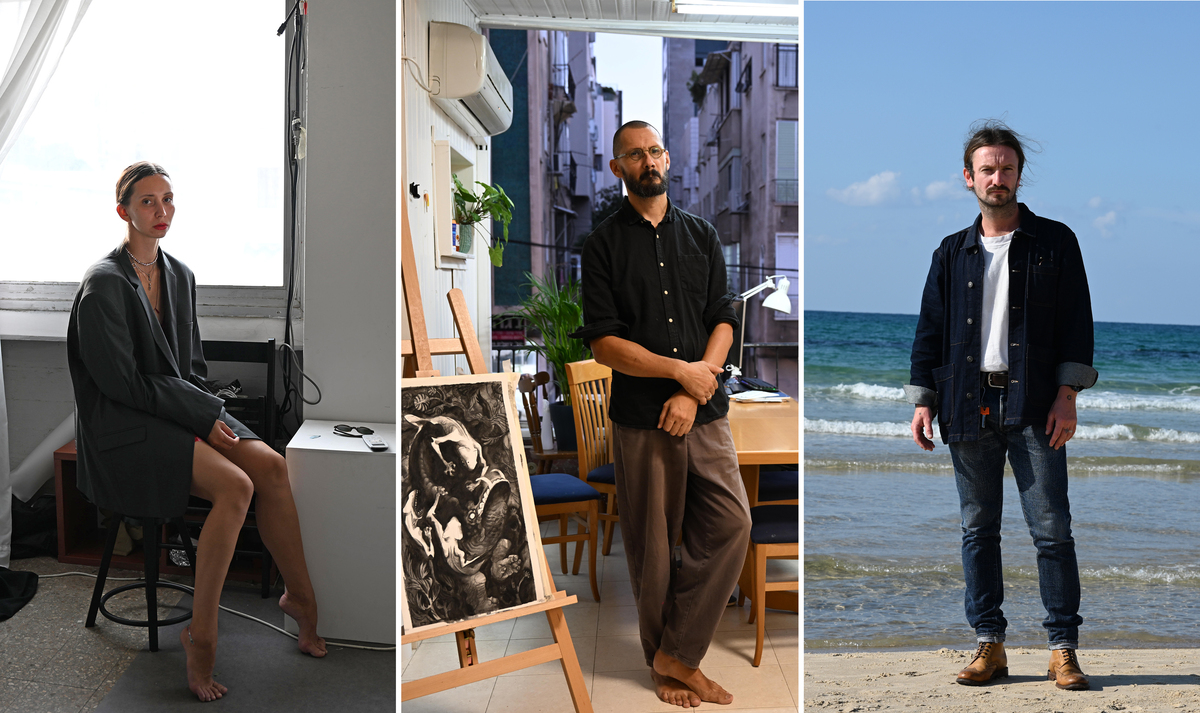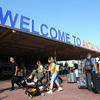
[ad_1]

Choreographer Polina Mitryashina, artist Victor Melamed, and jazz producer Evgenii Petrushanskiy, from left, in Tel Aviv on Nov. 2. All three are Russian artists who’ve just lately fled Russia to stay in Israel.
Tanya Habjouqa/NOOR for NPR
conceal caption
toggle caption
Tanya Habjouqa/NOOR for NPR

Choreographer Polina Mitryashina, artist Victor Melamed, and jazz producer Evgenii Petrushanskiy, from left, in Tel Aviv on Nov. 2. All three are Russian artists who’ve just lately fled Russia to stay in Israel.
Tanya Habjouqa/NOOR for NPR
TEL AVIV — Some of Russia’s greatest inventive abilities have immigrated to Israel this 12 months, discovering a protected place to rebuild their careers and voice their conscience about their nation’s conflict in Ukraine.
Since Russia invaded Ukraine in February, it has cracked down on even the slightest opposition to the conflict, compelled 1000’s of residents to enlist to battle and drawn powerful sanctions from the West. All this has prompted many Russians to flee.
More than 28,000 Russian nationals have acquired Israeli citizenship because the conflict started, in line with Israeli authorities figures. They embrace a pop superstar, a top photojournalist and plenty of different creatives in artwork, theater, movie, music and dance.
“Staying behind the Iron Curtain was incredibly scary,” Russian artist Victor Melamed says, evaluating Russia’s present isolation to the Soviet Union through the Cold War.
Melamed, whose portraits have appeared within the New Yorker journal, fled to Israel in June. He says: “I want to be a person of the world.”
Russians are relocating principally to Turkey, Kazakhstan and Georgia. But Israel gives one huge benefit: Those with no less than one Jewish grandparent can get Israeli citizenship for themselves and their shut household.
“When the war started, I think, like, everybody literally remembered their Jewish grandma,” says Liza Rozovsky, a Russian-born Israeli journalist monitoring Russian celeb arrivals for the Haaretz newspaper.
Israel defines itself as a refuge for Jews, which is why it is already house to 1 million Russian-speakers who fled the crumbling Soviet Union within the Nineteen Nineties.
Some Ukrainian immigrants in Israel want the Russian newcomers would keep in Russia to protest their management, regardless of the dangers. “They’re trying to run away,” says Ilona Stavytska, 33, a Ukrainian-born barista in Tel Aviv.
But Russian exiles say their protest is more practical right here. “Go protest in Moscow. I will support you. I will say, ‘Oh, look, this person is protesting.’ Then I will send you letters to jail,” says Maxim Katz, 37, a Russian YouTube blogger and former opposition politician who escaped to Israel and publishes anti-war videos to audiences in Russia.
Here are three Russian artists who escaped to Israel this 12 months and nonetheless grapple with the nation they left behind.
A Russian jazz label migrates to Israel

Grammy-nominated jazz producer Evgenii Petrushanskii at a waterfront park he frequents in Tel Aviv on Nov. 2.
Tanya Habjouqa/NOOR for NPR
conceal caption
toggle caption
Tanya Habjouqa/NOOR for NPR

Grammy-nominated jazz producer Evgenii Petrushanskii at a waterfront park he frequents in Tel Aviv on Nov. 2.
Tanya Habjouqa/NOOR for NPR
What a distinction a 12 months has made for jazz producer Evgenii Petrushanskii. Last 12 months, his file label in Russia, Rainy Days Records, produced a jazz album which bought nominated for a Grammy. This 12 months, the file label has gone silent.
“I don’t feel it’s the right time now to release music as a Russian label,” Petrushanskii, 36, says at a Tel Aviv espresso store. “For the ethical reasons, I stopped.”
Days after Russia invaded Ukraine, he left St. Petersburg for Tel Aviv, claiming Israeli citizenship primarily based on his father’s Jewish roots.
“It’s impossible to release a record in Russia so it goes to the foreign audience,” Petrushanskii says. “A majority of music aggregators who release music toward the platforms like Apple Music, Spotify — they’re not working. They’re not presenting in Russia anymore.”
Now he is re-registering his file label in Israel, hoping to launch new data of Russian artists subsequent 12 months.
A Russian choreographer just isn’t wanting again

Choreographer and dancer Polina Mitryashina in a dance studio in Tel Aviv on Nov. 2.
Tanya Habjouqa/NOOR for NPR
conceal caption
toggle caption
Tanya Habjouqa/NOOR for NPR

Choreographer and dancer Polina Mitryashina in a dance studio in Tel Aviv on Nov. 2.
Tanya Habjouqa/NOOR for NPR
Polina Mitryashina, 28, labored at one of many world’s main dance establishments, Russia’s Mariinsky Theater. Then when the conflict broke out, her dancers started to fade.
“Now they’re in Oslo,” she says. “They left Russia too.”
Mitryashina attended a latest networking occasion on the Israel Festival in Jerusalem, which introduced 100 Russian and Ukrainian artists in movie, music, artwork and dance — new immigrants like her — to satisfy veteran Israeli inventive administrators and attempt to rebuild their careers in Israel.
“Sometimes I’m angry [at] the people who stay … and continue to work for the big companies, and continue to make money” in Russia, she says. “I am like, ‘Are you crazy? You, you’re like a sponsor of the war.'”
A portrait artist attracts Ukrainian conflict victims

Illustrator and portrait artist Victor Melamed at his house in Ramat Gan, Israel on Nov. 2 with Yegor, one among his 16-year-old twin sons.
Tanya Habjouqa/NOOR for NPR
conceal caption
toggle caption
Tanya Habjouqa/NOOR for NPR

Illustrator and portrait artist Victor Melamed at his house in Ramat Gan, Israel on Nov. 2 with Yegor, one among his 16-year-old twin sons.
Tanya Habjouqa/NOOR for NPR
Artist Victor Melamed, 45, moved his household to a quiet Tel Aviv suburb to maintain his teenage boys out of a possible Russian navy draft — although they are going to probably be drafted into the Israeli military.
“I have no romantic visions of, you know, Israel’s policies,” he says. “The Israeli army is an institution that cares for every person they have … as opposed to the Russian army.”
Each morning he attracts a black-and-white portrait of a Ukrainian civilian killed in a Russian assault, and posts it on Instagram. He says it is his means of pinching himself, to not get too snug in his new house in Israel.
“This time is very demanding. We need to grow up,” he says. “We cannot afford to stay the same.”
Natan Odenheimer contributed to this story from Jerusalem.
[adinserter block=”4″]
[ad_2]
Source link
